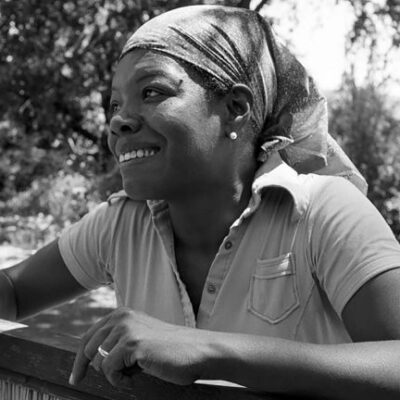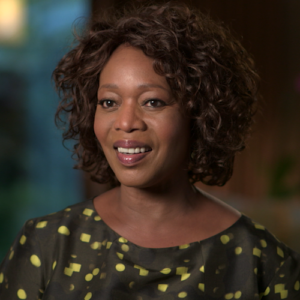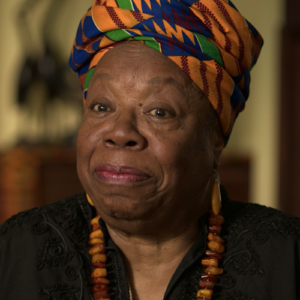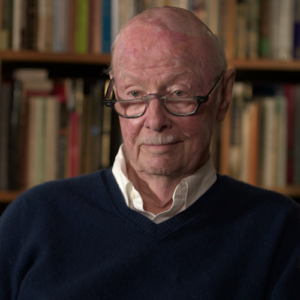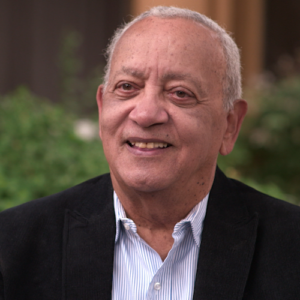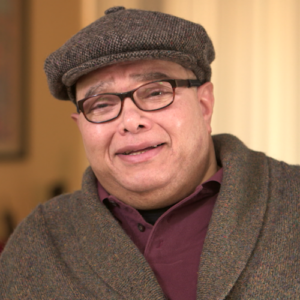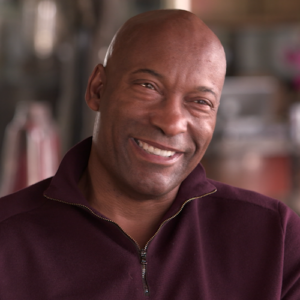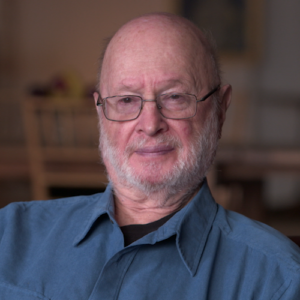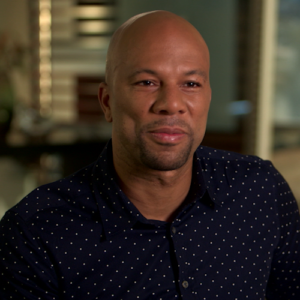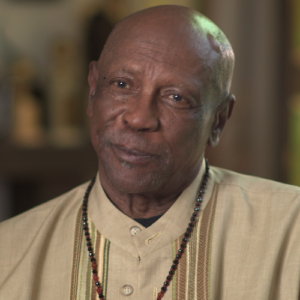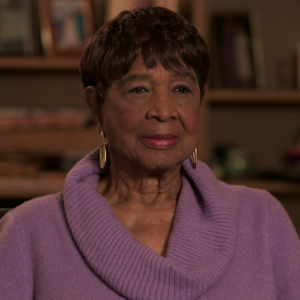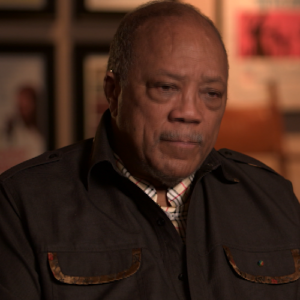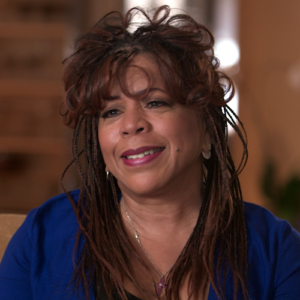Interviewer: Can you tell me about one of your first encounters with Maya Angelou, how you first came to meet or know her?
Diahann Carroll: The one that comes to mind, as I said earlier, the one that comes to mind is the nightclub performance at The Ye Little Club, which was in Beverly Hills, and most of my friends were not familiar with Maya. I from my first encounter with her work. It became very much a part of my life. And what I remember is Maya making her entrance in this little boy what is charming, little white, very tall, very grand, no shoes. Right up to the to the microphone and continued to tantalize us. And we just didn’t know what to make of Maya. The first time I saw her, except that she was an original is certainly an understatement. And what she had to say, she believed in it, and therefore she pulled us in immediately. We began to believe in it is a little trip that she placed in front of us was a lovely place to go see do. She made us feel pretty and informed because that’s what she thought of herself. I stayed throughout the evening. I really I didn’t realize I was going to stay there, but I just could. I was mesmerized. And then after, when we just said hello home, her humanity as well as her, her comfort with people was really quite amazing to me. I was not brought up with that, and nor did I really feel many people in my family possessed that kind of Hello, let me take you into my life. I learned that day that whatever it is you feel about yourself is what you impart to to the audience. And if you feel good about yourself, it makes them feel good about themselves. And that’s a lesson I will always think my age allow for that lesson.
Interviewer: When when you saw her there. I’m not sure if at that time there was any of her work to read. This was the earlier point where she was just performing. And was she singing? Dancing?
Diahann Carroll: She was doing all of the above.
Interviewer: It’s wonderful that you remember that in that little club.
Diahann Carroll: Yes. I talked some friends of mine into going to this little club. It was not exactly known if it was prejudice or not. So we gathered together our little group that touched all bases white, black, green, yellow, Asian. And that’s how we came together to see her. I don’t recall ever being in that club prior to that.
Interviewer: And what was the club like? Was it exclusive or what was the club like?
Diahann Carroll: You mean there in terms of. Well, when we came to the front door, everyone seemed to be very welcomed there. And later speaking with Mya, I realized that everyone there was as startled by her as we were. So she was a very good influence on moving around in Beverly Hills, which I had done for many years, but never deciding to test something without having it prepared for for our entrance.
Interviewer: In 1959, you played Clara in Porgy and Bess, and Maya Angelou was a dancer. Tell me a little bit about that time and if you had any encounters with Maya Angelou that strike you from that time period.
Diahann Carroll: No, we didn’t have an encounter, as I recall. An awful lot of people.
Interviewer: Let’s pause for this plane. Sorry.
Interviewer: So if you just let me know when the plane passes that even though you know, when Porgy and Bess you played Clara and Maya Angelou, I was a dancer, but there wasn’t really a connection at that time since it was a fairly large cast. And that was for the good theme of the movie. That was not any kind of touring with Porgy and Bess. No, just the movie. Okay, let me know, because no one will hear my questions.
Diahann Carroll: All right, that’s fine. It was. So you little club, we’re assuming was late fifties, early sixties. And I really did not know Maya at that time when when I began to shoot the film Porgy and Bess, I did not know Maya. And I was very excited and probably very tense to shoot this movie. It may have been my first or second film, and I was impressed by the cast, impressed by the director, and we were all immersed in whatever it was we were supposed to put on camera.
Interviewer: So later on in Maya Angelou performed at the Purple Onion and other clubs during the late fifties in San Francisco. Did you ever and also Phyllis Diller performed at the Purple Onion. Did you ever attend the Purple Onion or remember Maya Angelou performing there during those times?
Diahann Carroll: I do not remember Maya being there in San Francisco. I’m trying to remember why I was in San Francisco. It seemed to me all of my life, wherever I was, it had something to do with work. So I know the name. I remember the name. But no, I don’t think we knew each other then. And then, you know, Maya had this way of sort of if something intrigued her, she would find a way to go there, not necessarily announced, but you would see her and you’d say, That’s Maya Angelou. But she was gathering her crowd, her group of people in the industry, and she did it quietly. And then usually, usually she introduced herself to you. And just as simply she would say that I came to see you, I came to see your work or something that made us mutually comfortable. She knew that she was unusual, and so she worked to make you feel comfortable with that. This woman, who was six feet six to something like that and her how manner with others, particularly new people in her life. Very gentle, very respectful. But I, I certainly was familiar with the name Purple Onion because it had been around and I knew of that, but I don’t recall it ever being a part of my performing life either.
Interviewer: Okay. Well, when you played the role of Vivian Baxter, Maya Angelou’s mother in the 1979 television movie I Know Why the Caged Bird Sings. Tell me how you came to play that part and what you knew about the book Caged Bird, either before or or how that came about. Mm hmm.
Diahann Carroll: There was a period of time when Caged Bird was really almost another Bible for me. I carried it with me, and whenever I needed to hear something that was uplifting but also beautiful, I would keep the book by the bed. And it was great instruction. Women of our time, how she thought Maya, how she introduced everything into one big pot, which was called Maya. This is the way I see it. This is what I want to impart to you. Do you share my. So I. Yes. I was very much a part of caged bird. But as far as Porgy and Bess, I think that was just one of those situations. When you’re called by your your agent, would you like to do a film called Porgy and Bess, which not all. Black Americans really wanted to do at that time. It was a big decision as to whether this was all something that should be done, that should be filmed. And most of us agreed upon the fact that the music was outstanding. It was wonderful. The characters were not that pleasing to us. And when you can imagine my mother, she was not really pleased that I was going to do Porgy and Bess. I don’t believe that we ever had a chance to discuss that until there was a meeting. But if you’re going to do Porgy and Bess, one must do Porgy and Bess. And if you’d like to exchange that for something else that is necessary, I think to write something else. Because that was the perspective, the musical perspective of the Gershwin’s. And I think just as there are some arguments in the Jewish community, if Molly Greenberg Goldberg should ever have been created or placed. I think the thing to do is create the way you see it and then put that out there for the for the audience to judge. And I think Maya, from what she was very comfortable. I know that. And so was I. I’m sure if we discussed it at all, it would have been something along those lines.
Interviewer: Well, with Caged Bird and it being 1979 and you playing in that part, was that another situation of your agent called and said, Would you like to play Vivian Baxter? And I know How the Caged Bird sings. And by you having such a close relationship with the book prior. How do you feel about playing that character of Vivian Baxter? She was a pistol.
Diahann Carroll: Yes. I loved her. Really. She was slightly mad. And how her exchange on the page was very like Maya’s exchange in life. I was it really it. I think the industry was very different then. I don’t think that calling the person, the actress, the actor, the singer to find out if you’d like to be a part of this film, that 20th century, whatever. I don’t recall having that experience with anyone. Usually during that period of time, a picture that huge is being handled by someone else who is also very successful and very. So the calls usually came from the the agent to my agent and then to me. But I think most of us were hired that way at that time. When I say us, I’m talking about black actors, actresses, singers, dancers. But I don’t I don’t really remember having any conversations with anyone who’s a director. And it’s just as well because my always unnerved me, her brilliance, even when she said hello, but there was another encounter. I’ll have to re play that for myself with with Maya. I was doing something on a radio show and Maya was there in the in the cage, as I call it. And that developed into an evening of of conversation, pulling apart ideas. She was very womanly and her after you in her presence for a while. You’re also very aware of her sensuality, her sexuality, and her sensuality. She was not the cliché that I had become accustomed to a woman who was maybe her age or older, but having no contact with their own sensuality. Maya wasn’t like that at all. She may have looked like a professor, but she also took with her this feeling of she wanted to do everything she wants to do in life and that I respected greatly. It was nice to have her in my life, and I was very proud to be in her life. I just want to say that during that period of time when they were shooting Porgy and Bess, I was ecstatic to be there for many reasons. I had other reasons for not wanting to be there, but the reasons came out on the plus side, and I think it was prior. I think Porgy and Bess was prior, and then I was involved in something else that was questionable. It was the part of the mother, Vivian Baxter in Caged Bird, and she was really very like her creator, Max. It was definitely a role that Maya identified with and in every sense of the word. And I do recall that was one of our first discussions about the period of time when she did not speak. When Maya did not speak for very long, she was a lot to adjust to her mother’s freedom and her being really afraid of almost everything except that her insides were screaming to be acknowledged. And that’s why we got this very silent child while her mother became really the little performer in the nightclub. She was a lot to deal with Maya’s mother. And when I read about her, I talked about it. I realized she was someone that would be really great fun to play you.
Interviewer: You’re making me remember the scene when, after Maya has been raped by Vivian Baxter’s boyfriend and Vivian Baxter gives a party at the house for Bailey and Maya to try to bring Maya to speak. And at the end of that has to tell her I don’t know how to take care of you anymore. I just remember that is a painful scene to watch. Can you recall anything from that playing?
Diahann Carroll: That’s the mother, Vivian, saying to her daughter, I don’t know how to take care of you. Yeah, that I don’t remember the exact dialog, but there was much about Vivian Baxter that was painful. And this child being exposed to the things that were, let’s just call them more negative than the positive. But she had a lot of positive. She loved music and she loved to dance. Vivian So I would assume as a girl. That Maya was fascinated by her mother.
Interviewer: And that was that was such a wonderful scene. And, I mean, you played Vivian Baxter with all of her wild party flair and a tough woman loving her children, but not really knowing how to mother.
Diahann Carroll: She didn’t understand Vivian, but she did not understand her responsibility. You know, as I’ve said many times, trying to carry myself through raising my child and now my grandchildren. Nobody gives us a manual for this. Really. This raising our children is something because today what is today? This is 2014. There’s so much more information. And it’s it’s imperative that we hold on to what we have. I don’t think Vivian really understood what was expected of her as a parent. She had not a clue. And then the child has to pay the price for that. But she came through. Maya definitely came through. And I think she has a great affection for her life with her mother.
Interviewer: That’s great. Great. Now I want to move to sister. Sister with sister. Sister being written by Mayor Maya Angelou and airing in 1982. You played the role of the older sister, a very sophisticated churchgoing and church supporting woman who was leading a double life and actually having an affair with the minister, because that was a film that Maya wrote. Tell us about that role and any work you did with Maya Angelo in preparing for it.
Diahann Carroll: I just want to comment that I, I don’t believe that we can actually say that Maya was leading, quote, a double life. I think Maya comes from the thought that you’re living your life. You can’t do double. Whatever you do is your life. There may be someone who does not approve. And the part of you that goes to goes to see a priest. Your minister has one slot for the to identify with you, and then they want to put the other thing. But it’s one life is one life. I heard that remark so many times when I usually visit my grandmother from North Carolina. But eventually, as one gets older and I don’t know how much time I have to go much older, but. It’s just necessary if we’re going to accept all the incredible things that Maya Angelou is responsible for bringing to our lives. It’s freedom, freedom of thought, freedom of behavior, freedom of whatever intrigued her. She wanted to do that and did do it. I couldn’t get over how many pages there were of her accomplishments that just remind me. A million years ago, I was doing a concert someplace, and one of the musicians got up in the middle of the concert and he said good night to be. And he walked off stage and I finally said to conductor, What is that? He said, Well, he’s the butcher, and this is the time of day when everybody’s coming home and they want to buy. And he has to be there in order to serve the public. And I realized then I see my life has always been showbusiness. That’s it. All of it. And I forget that there are other people who do other things.
Interviewer: So you’ve got to go make that. You’ve got to go cut the meat now.
Diahann Carroll: Yes. I thought that was rather healthy of him to held. I think he was playing the violin or something. But to have held on whatever was his love for music and the butcher’s shop.
Interviewer: So that made his livelihood. Yes. Now, I want to ask you, I don’t know how familiar you were during the time with Maya Angelo’s involvement in civil rights with Martin Luther King, as well as Malcolm X. Do you have any thoughts about her activism?
Diahann Carroll: No, I think there was a large group of black Americans who were involved with Dr. King social activism. However, we didn’t singly if we met in Washington and there was a meeting and we were able to have time together at that time. Then one was usually leaving to go to, let’s say, L.A., Chicago. So I we didn’t have I didn’t have a lot of time around a special group because I think I chose a few groups that I felt with my heart and soul that I needed to have time with these particular people for my own benefit, that as well as helping in that particular organization. Okay.
Interviewer: Did you watch President Clinton’s inauguration and Maya Angelou reciting the poem on the Pulse of Morning? And if so, what were your thoughts?
Diahann Carroll: She was overwhelming. She was magnificent. And I kept thinking that this is another first for Maya, a black woman. Her response and I’m sure the request came from Bill and Hillary Clinton, but her response to their request, the quality of what she wrote and how many times most of us were touched so deeply by. But what she had to say. I just thought it was another magnificent star in her in her life.
Interviewer: Over the years, you may have read many of Maya Angelou’s books and poems and still that Rise of Phenomenal Woman. What is your understanding of what her work means in the culture, all of this work that you saw in the bio? What what do you think it means in our American culture?
Diahann Carroll: First of all, I’m very grateful and I’m sure most people who have spent time in the ghetto, they grew up there. We acknowledge that we have to be grateful to Maya to have Maya has the kind of intellect that embraces the fact that we need to hear what she is, who she is, and how she does it. Because as I’ve said before, we were talking about raising children. There’s no manual about to whom we should listen. We have to find it on our own. I was quite I was much younger when I found Maya, and she was much younger writing and finding herself. We can’t call it a contribution. She almost helped to reshape the thoughts of young black Americans and white Americans. Her confidence and how she perceived our everyday living was a lesson I learned through Maya. And I feel so many young people have learned that lesson. If these are your thoughts, it may be negative about something or positive. Why do you have these thoughts? Where did where does this information come from that you have? She taught us to be do better research and become more informed about who or what it is you think you’re taking into the world. I think that that’s her greatest gift to all of us.
Interviewer: As a groundbreaking performer and actress, especially bringing us Julia at a time when black women were not the subject of such a television series. And that was just beautiful. And then being a widowed woman with a small son, bringing us to Julia and forging all of that new territory. How do you relate some of your story as an actress and pioneer to Maya’s story of pioneering as well?
Diahann Carroll: Well, the business of of pioneering, I think, is a part of the lives of so many people who decided that they needed to understand their path. And as I said before, I do the research and and try to behave with the kind of knowledge that would take us forward. This sameness about, I am honored to say, is taking ourselves who we are into places where I’ve never been and never been a black woman going into those areas. We have to applaud her. We have to celebrate her. We have to be thankful to her to recognize what she was doing. Maybe in the beginning we didn’t really understand exactly what she was doing, who she was, but she gave us time to understand the Maya Angelou, the expression about the times when she was abroad and when she as in going abroad, and then the times when she was saying things that we had never, never thought about before and that she had the right to say, do and be just that that we have to thank her for. She was never pushy about it, never confrontational. I deserve she just was herself and in very gracious way. You know, I, I can’t say it enough about her. I was doing a play, I think it was Atlanta. And after we all agreed to meet in the restaurant, in the hotel, we were staying. And I walked through the restaurant and Maya was sitting there having some lunch and I looked. Did her and she said, Yes, yes, it’s me. And I said, Did you come here to see me? She said, Indeed, I did. Do you know what it meant to me? And this was only maybe, what, 10 to 12 years ago to know that Maya drove to the plane, took a train, whatever, to come to see something I was doing so that she could be evaluated in that Maya Angelou brain. I. I think she almost brought me to tears just knowing that she was there. As you. I can’t say enough about my really. I remember a phone call from Ireland. She said to me, Send some books to my daughter. And I said, I am sorry. I’m not for me. She said, That’s why I’m sending them. You should know and you should share it with Suzanne. She’s something. But during that period, I think it was very important that she was alive, that her brain was here and. I can only say I don’t know how to show her what she meant because we we were both dealing with a part of the world that I, I don’t know how many of the black Americans at that time had had that experience. And I came to California to star in a television series, and I was frightened, but I knew I had to do it. It wasn’t a matter of just, well, maybe I did that because I was afraid to come to try to do Julia. But, you know, I think about people like Maya who were willing to, quote, take a chance, unquote. And it could have meant the end of me, because that’s the largest audience you can have in the world is a television audience on a weekly basis. And because of things, I knew about her others as well, but more so about Maya, that this is something that you do. Yes, it’s a new experience, but you have to do it. You have to walk across the bridge. There was so many people that I met at that time who were dead. Did you ever meet Maya Angelou, do you know? And they were curious about what I took away from the meetings. And very often I would say to them, why don’t you why don’t you try to cross the bridge to so that you can meet Maya? Because she will not stand for someone who is just standing still? And that’s why you have to love her. You really. You really do.
Interviewer: I thought that was fantastic. And what I really, really love was that story about her coming to see you.
Diahann Carroll: Yes. You know, without telling me how she made all of her own arrangements. And I don’t it. Yeah, that’s. That’s who she is.
Interviewer: So we were all and you said earlier in the interview, I thought it was fascinating, you said that Maya unnerved you with her brilliance a lot. Quite. Please. So I was wondering what you meant by that. That’s such an interesting statement you said. Maya unnerved you with her brilliance. So what did you mean by that?
Diahann Carroll: Well, you know, kind of like I was coming apart at the seams. I never I’d never really seen anything. Anyone, any human being like Maya Angelou. And. I think it was happy making as well as very disconcerting. And I, I like people like that. I was very happy that this woman was more than human. Bigger than life. The things that are turned against her. She knew how to wrangle that and make it something positive.
Interviewer: The book “I Know Why the Caged Bird Sings”. And much of her literature is about triumph over adversity. And you have also triumphed over discrimination over the way things were cast in the fifties and sixties. And you were a pioneer with You’ve already talked about Julia, but could you I wonder if there’s if you related to that book and you said it was like your Bible says that one of the reasons. Can you talk about that that that triumph that never that perseverance that she had that you kind of related to it was that something that that that you could relate to?
Diahann Carroll: Yes, I can relate to watching Maya Angelou as she shared her thoughts, her self-confidence, her her research, her everything. She shared it all with us. And I knew that there was something there that had to be listened to. And even though you may not really agree with all of it, it was my responsibility to take it into my life and and try to understand it. And I felt that was the responsibility of most of us there. There is no other. Maya Angelou. And and I think we must take note of that. You know, we all have a certain amount of time here and taking advantage of that time here and with whom you spend that time here is. It’s something that I. That’s why I told you about her coming. She. She made up her mind that she wanted to see me. She wanted to see. To feel me. Such as? I had wanted to see her and feel her. As some of you want included, if you might. You don’t want Maya to walk through here without leaving the information that she has. You just don’t.

